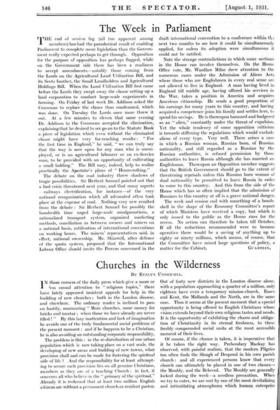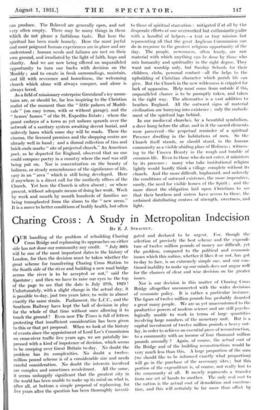Churches in the Wilderness
By EVELYN UNDER !JILL.
1 N those corners of the daily press which give a more or -L less casual .attention to " religious topics," there have lately appeared insistent appeals for help in the building of new churches ; both in the London diocese, and elsewhere. The ordinary reader is inclined to pass on hastily, murmuring " More churches, more money for bricks and mortar ; when those we have already are never filled ! " By this lazy inattention and lack of imagination he avoids one of the truly fundamental social problems of the present moment : and if he happens to be a Christian, he is also avoiding an outstanding corporate responsibility.
The problem is this : in the re-distribution of our urban population which is now taking place on a vast scale, the developing of new areas and building of new towns, what provision shall and can be made for fostering the spiritual side of life ? And the responsibility for at least attempt- ing to secure such provision lies on all genuine Christians, members as they are of a teaching Church : in fact, it concerns all who believe in the " primacy of the spiritual." Already it is reckoned that at least two million English citizens arc without a permanent church or resident pastor. Out of forty new districts in the London diocese alone, with a population approaching a quarter of a million, only eighteen have even a temporary mission-church. Essex and Kent, the Midlands and the North, are in the same case. Thus it seems at the present moment that a special opportunity is being offered to English Christians whose vision extends beyond their own religious tastes and needs. It is the opportunity of exhibiting the charm and obliga- tion of Christianity in its eternal freshness, to these freshly compounded social units at the most accessible moment of their lives.
Of course, if the chance is taken, it is imperative that it be taken the right way. Prebendary Mackay has observed, with painful realism, that the modern Pilgrim too often finds the Slough of Despond in his own parish church : and all experienced persons know that every church can ultimately be placed in one of two classes— the Mouldy, and the Beloved. The Mouldy are generally locked during the week—a needless precaution. When we try to enter, we are met by one of the most deyitalizing and . intimidating atmospheres which .human enterprise can produce. The Beloved are generally open, and not very often empty. There may be many things in them, which do not please a fastidious taste. But here the spiritual has been made homely. Here the most joyful and most poignant human experiences are in place and are understood ; human needs and failures are met on their own ground, and irradiated by the light of faith, hope and charity. And we are now being offered an unparalleled opportunity to turn our backs with decision on the Mouldy ; and to create in fresh surroundings, maintain, and fill with reverence and homeliness, the welcoming church which alone will always conquer, and alone is always loved.
As a field of missionary enterprise Greenland's icy moun- tains are, or should be, far less inspiring to the Christian realist of the moment than the " little palaces of Muddi- vale " (on easy terms, with or without garage), and the "heroes' homes " of the St. Expedito Estate ; where the gaunt embryo of a town as yet unborn sprawls over the network of a sanitary system awaiting decent burial, and unlovely lanes which some day will be roads. There the cinema, the licensed premises and the shopping centre are already well in hand ; and a dismal collection of tins and brick-ends marks " site of projected church." An American poet, as he departed for England, observed that no one could compose poetry in a country where the roof was still being put on. Nor is concentration on the beauty of holiness, or steady remembrance of the significance of life, easy in an " area " which is still being developed. Here if anywhere is a direct call for the motherly offices of the Church. Yet here the Church is often absent ; or where present, without adequate means of doing her work. Week by week and month by month hundreds of families arc being transplanted from the slums to the " new areas." It is a move to better conditions of bodily health, but often to those of spiritual starvation : mitigated if at all by the desperate efforts of one overworked but enthusiastic padre with a handful of helpers—a tent or tiny mission but representing all that the great Anglican Communion can do in response to the greatest religious opportunity of the day. The people, newcomers, often lonely, are raw material with which anything can be done by those who mix humanity and spirituality in the right degree. They want not worship only, but Sunday Schools for their children, clubs, personal contact—all the helps to the upbuilding of Christian character which parish life can give. But the Church in the new wilderness is 'crippled for lack of apparatus. Help must come from outside if this unparalleled chance is to be promptly taken, and taken in the right way. The alternative is a vast addition to heathen England. All the outward signs of material civilization are hurrying into existence ; only the embodi- ment of the spiritual lags behind.
In our mediaeval churches, by a beautiful symbolism, a dove hung before the altar, and in it the sacred elementa were preserved—the perpetual reminder of a spiritual Presence dwelling in the habitations of men. So the Church itself stands, or should stand, in the human community as a visible abiding place of Holiness ; witness- ing to the Unseen Beauty in the rough and tumble of common life. Even to those who do not enter, it ministers by its presence : many who take institutional religion lightly would hardly think a village complete without its church. And the more difficult, haphazard, and unlovely the conditions of outward existence, the more imperative, surely, the need for visible homes of the Spirit ; and the more direct the obligation laid upon Christians to see that their brothers and sisters have access to these, the ordained distributing centres of strength, sweetness, and light.



































 Previous page
Previous page